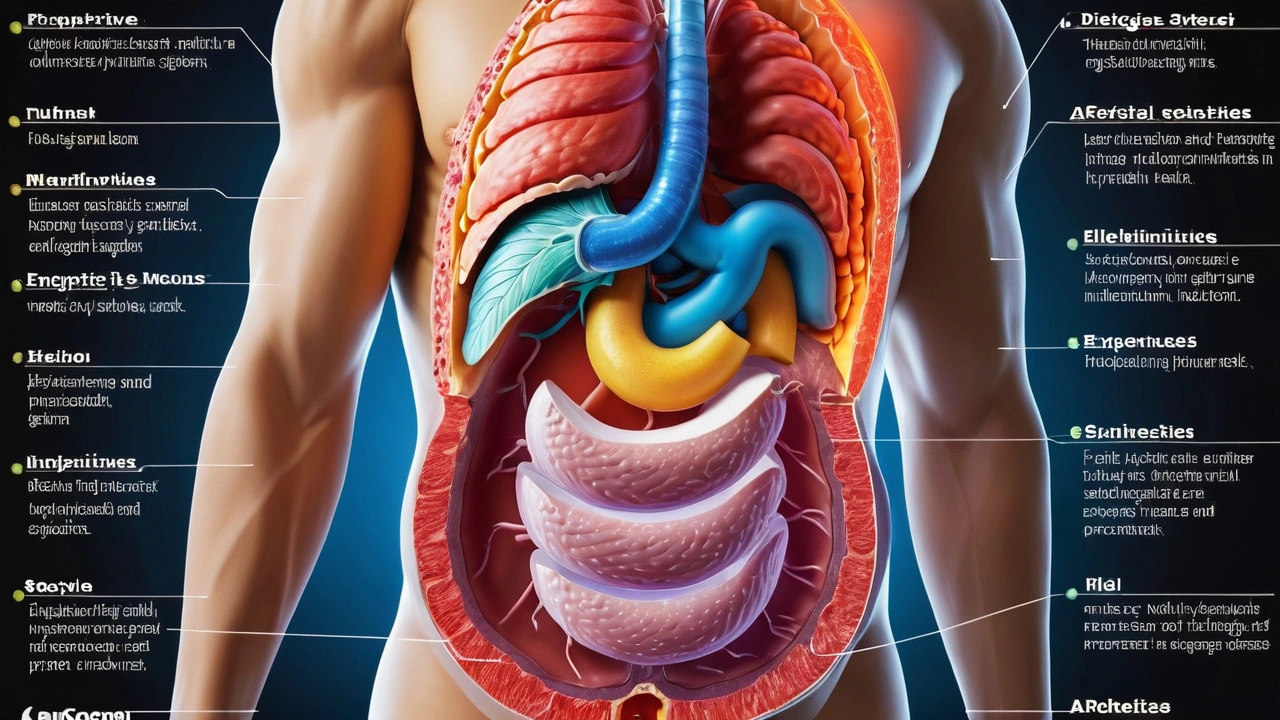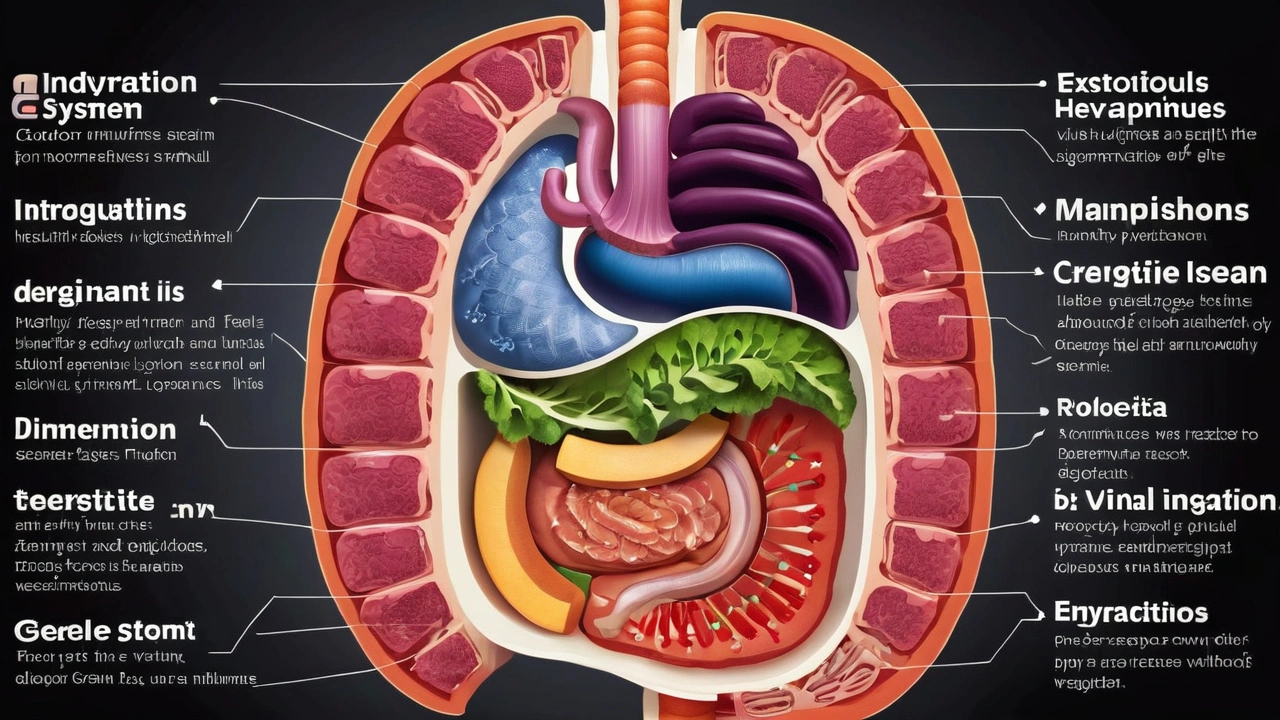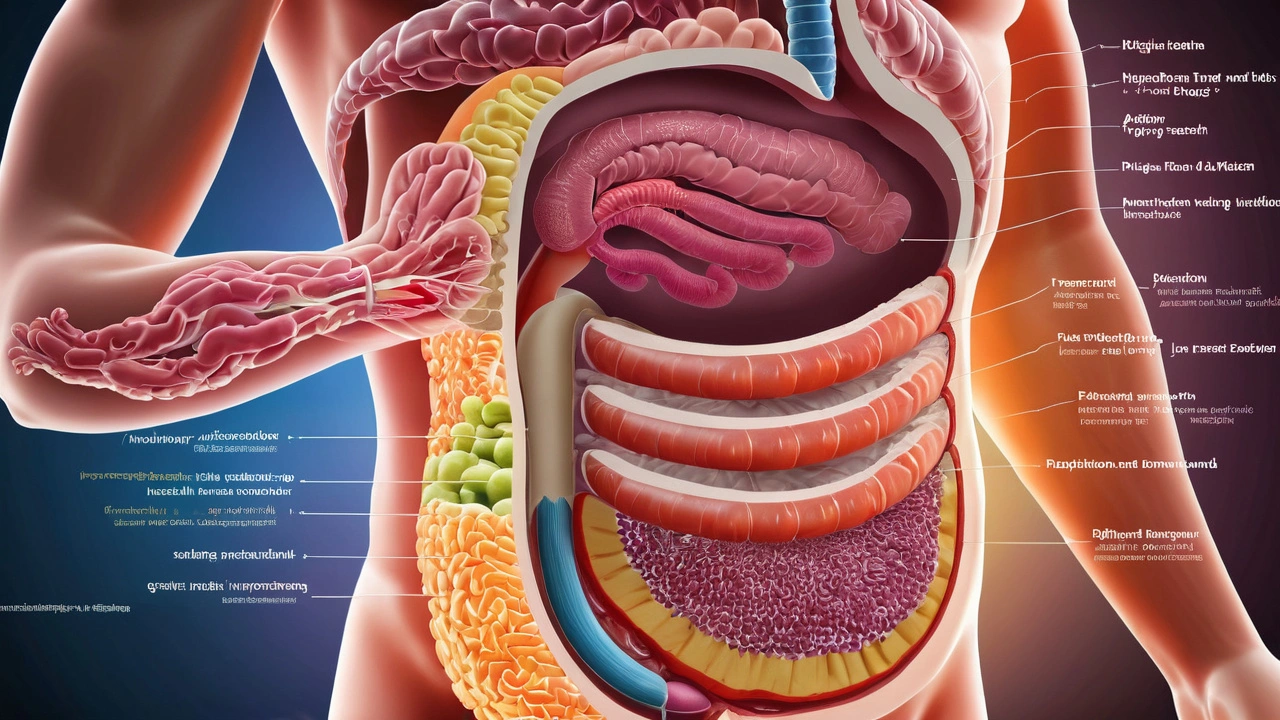When we think of health, we often focus on aspects like exercise, heart function, or mental wellness. But did you know your digestive system is a powerhouse that can influence all these areas? Gastro health is indeed the unseen hero of our body, supporting everything from our immune system to our mood.
Our gut is filled with trillions of bacteria, many of which are essential for breaking down food and absorbing nutrients. A balanced gut microbiome not only aids digestion but also boosts our immune defense, keeps our minds sharp, and even helps maintain our energy levels throughout the day.
In this article, we'll explore the pivotal role of gastro health, how it's connected to our overall well-being, and share practical tips for nurturing your digestive system. Whether it's through balanced eating, adopting a healthier lifestyle, or understanding the science behind gut health, there's plenty you can do to ensure your digestive system stays in top shape.
- The Importance of Gastro Health
- How Digestive Health Impacts Immune Function
- The Connection Between Gut Health and Mental Wellness
- Dietary Tips for a Healthy Gut
- Lifestyle Changes to Support Digestive Health
The Importance of Gastro Health
Our digestive system, often taken for granted, plays a crucial role in our overall well-being. When it comes to maintaining a healthy body, the significance of gut health cannot be overstated. Our gut is home to an incredibly complex and diverse community of microorganisms, including bacteria, viruses, fungi, and more. Collectively known as the gut microbiome, these microscopic entities are fundamental to not only our digestion but also our immune function, mental health, and even weight management.
One of the primary functions of the gut is to absorb nutrients from the food we consume. Without a healthy digestive system, our bodies would struggle to extract the vital vitamins and minerals necessary for energy production, cell repair, and overall health. A well-functioning gut ensures that we get the most out of our diet, boosting our physical and mental performance daily.
The gut also plays a pivotal role in our immune system. Approximately 70% of the body's immune cells reside in the gut, making it the body's first line of defense against pathogens. When our gut health is compromised, our immune response can weaken, making us more susceptible to infections and diseases. Maintaining a healthy gut microbiome can help bolster our immune function, keeping us robust and resilient against illnesses.
In recent years, scientists have also discovered a fascinating connection between gut health and mental well-being. The gut-brain axis is a term used to describe the intricate communication network linking the gut and the brain. This bi-directional relationship means that the state of our gut can influence our mood, stress levels, and cognitive functions. High levels of certain gut bacteria have been linked to improved mental health, while imbalances in gut flora have been associated with conditions such as depression and anxiety.
"The gut is not like Las Vegas. What happens in the gut does not stay in the gut." - Gastroenterologist Dr. Stephen A. Wangen
Moreover, gut health can significantly impact our energy levels. A balanced gut microbiome aids in the fermentation and breakdown of food, particularly fibers, producing short-chain fatty acids (SCFAs) in the process. These SCFAs serve as a vital energy source for the cells lining the colon and play a role in regulating metabolism. Consequently, a healthy gut can help individuals maintain consistent energy levels throughout the day, avoiding the dreaded energy crashes that can hinder productivity and well-being.
Furthermore, maintaining a diverse and balanced gut microbiome is essential for weight management. Certain gut bacteria can influence how our bodies store fat and regulate hunger and satiety signals. People with a diverse gut microbiome are more likely to have a leaner body composition compared to those with less diversity in their gut flora. Thus, prioritizing gut health can be a valuable strategy for those looking to achieve and maintain a healthy weight.
Given its far-reaching impact on various aspects of health, it becomes evident that caring for our digestive system is not just about avoiding stomach aches or indigestion. It's about ensuring that our
How Digestive Health Impacts Immune Function
Our digestive system is far more than just a passage for food. It plays a pivotal role in our body’s defense mechanisms. Around 70% of our immune system resides in the gut, making gastro health critical for warding off illnesses. This vast network of immune cells located in the gut works tirelessly to keep harmful bacteria and viruses at bay, while allowing beneficial nutrients and microbes to thrive.
Within our gut, the microbiome—an ecosystem of trillions of bacteria, viruses, and fungi—actively communicates with immune cells. A balanced microbiome ensures that the immune system responds appropriately to threats. Regular imbalances, such as those caused by stress or poor diet, can lead to inflammation and a weakened immune response. It's like having a guard that's always on duty, ready and vigilant when things are in balance, but confused and overreacting when they are not.
Research has shown that certain gut bacteria stimulate the production of essential immune cells. For instance, Bacteroides fragilis has been found to enhance the production of regulatory T cells which help to prevent autoimmune responses. Studies like these underscore the need for maintaining a healthy gut to bolster our immune defenses against external threats.
“The microbiome plays such a vital role in maintaining immune balance, it's perhaps one of the most underappreciated aspects of health,” says Dr. Sarah Ballantyne, an expert in immunology and author.
A healthy gut can also help in reducing inflammation throughout the body. Chronic inflammation is often linked to autoimmune diseases, allergies, and even cancer. By nurturing your digestive health, you can lower systemic inflammation, allowing your immune system to operate more effectively. Consuming foods rich in probiotics, such as yogurt and fermented vegetables, can enhance the gut microbiome, promoting a resilient immune system.
Ensuring a diverse diet full of fiber-rich foods also supports the good bacteria in your gut. Fibers from fruits, vegetables, legumes, and whole grains act as food for these beneficial microbes. When these microbes break down fiber, they produce short-chain fatty acids which are key in reducing inflammation and supporting immune function. It's a domino effect where good food leads to a healthier gut, which in turn leads to a stronger immune system.
Interestingly, our gut and immune system also have a hand in managing stress. The gut-brain axis is a complex communication system between our gut and brain. Stress can negatively influence this connection, leading to gut imbalance and compromised immunity. Thus, managing stress through activities like meditation, exercise, and adequate sleep can greatly benefit both gut and immune health.
In today's world, where maintaining a robust immune system is more important than ever, understanding and fostering digestive health is indispensable. Simple changes in diet and lifestyle can make a world of difference, keeping the unseen hero of our body—our digestive system—in optimal health.

The Connection Between Gut Health and Mental Wellness
Most people don't realize just how intertwined the gut and brain are. This relationship, often referred to as the gut-brain axis, shows that our digestive system and mental well-being are in constant communication. The gut is sometimes called the body's 'second brain' because it contains a complex network of neurotransmitters, hormones, and immune cells that communicate with the brain.
One intriguing fact is that about 90% of serotonin, a neurotransmitter that regulates mood among other functions, is produced in the gut. This means that a healthy gut can contribute greatly to a positive mood and emotional balance. Dysbiosis, or an imbalance in gut bacteria, can lead to mood disorders such as anxiety and depression. Researchers have found that by treating gut issues, they can often alleviate symptoms of these mental health conditions.
This connection plays out in real life. When people experience digestive problems like irritable bowel syndrome (IBS), these issues are often accompanied by distressing emotions. Surprisingly, managing the gut health through diet, probiotics, and stress reduction can also lead to a better mood and lessened anxiety. There is growing evidence from studies showing that specific strains of probiotics, called 'psychobiotics,' can help improve mental health.
Nutrition also plays a crucial role in maintaining this gut-brain harmony. Foods rich in fibers, like fruits and vegetables, help feed the good bacteria in our gut. These bacteria, in turn, produce short-chain fatty acids that have been shown to have anti-inflammatory effects, which can protect the brain from inflammation and support cognitive function.
Managing stress is another vital aspect. Chronic stress can wreak havoc on both gut and brain function. Effective methods to manage stress include regular physical activity, mindfulness practices like meditation, and ensuring adequate sleep. These activities can lead to a healthier gut flora by reducing stress hormones that can disrupt the balance of gut bacteria.
"The myriad connections between our gut and brain underscore the importance of considering digestive health in the treatment of mental illnesses," says Dr. Jane Foster, a prominent neuroscientist studying the gut-brain axis.
| Positive Effects | Negative Effects |
|---|---|
| Balanced Mood | Anxiety |
| Better Cognition | Depression |
| Overall Well-being | Sleep Disorders |
Recognizing the gut-brain connection reinforces the idea that a healthy diet, rich in prebiotics and probiotics, combined with lifestyle practices that reduce stress, can significantly enhance mental wellness. It's a compelling reminder that taking care of our digestive system is not just about physical health, but mental prosperity as well.
Dietary Tips for a Healthy Gut
Ensuring your gut stays in good shape isn’t a complicated task, but it does require some conscious effort. The foods you eat can play a significant role in maintaining a happy and healthy digestive system. Let’s dive into some practical dietary tips that can help foster a balanced gut microbiome and enhance your overall well-being.
Firstly, increasing your intake of fiber-rich foods is a fantastic place to start. Dietary fiber acts as a friend to your digestive tract, aiding in regular bowel movements and preventing constipation. It’s found in fruits, vegetables, whole grains, and legumes. Think apples, carrots, brown rice, and lentils. A high-fiber diet can contribute to the growth of beneficial bacteria in the gut, promoting a more diverse and balanced microbiome.
Incorporating probiotics into your diet is another excellent way to boost gut health. Probiotics are live bacteria that are good for your digestive system. Foods such as yogurt, kefir, sauerkraut, and kimchi are rich in natural probiotics. These foods can help to replenish and maintain the levels of healthy bacteria in your gut, potentially preventing issues like bloating and irritable bowel syndrome (IBS).
Equally significant are prebiotics, which are essentially food for your good gut bacteria. Prebiotics can be found in foods like bananas, onions, garlic, and asparagus. When you consume these foods, they support the growth and activity of beneficial bacteria, creating a healthier gut environment. By pairing prebiotics with probiotics, you can create a synergistic effect that offers a more robust support system for your digestive health.
According to Dr. Michael Mosley, a well-known medical journalist, "A diet high in fibre and low in processed foods can play a crucial role in maintaining a healthy gut microbiome."
Hydration also plays a critical role in maintaining gastrointestinal health. Drinking plenty of water helps to break down food, aiding in nutrient absorption, and preventing constipation. Aim for at least eight glasses of water a day, but keep in mind that your hydration needs may vary depending on your activity level, climate, and overall health.
Avoiding processed foods and reducing sugar intake can greatly benefit your gut health. Processed foods often contain additives that can disrupt the natural balance of bacteria in your gut. High sugar intake, especially from refined sugars, can promote the growth of harmful bacteria and yeast. Opt for whole, unprocessed foods whenever possible, such as fresh produce, lean meats, and whole grains.
Fermented foods such as pickles, miso, and kombucha also deserve a spot in your diet. These foods undergo a fermentation process that produces beneficial bacteria, which can introduce a variety of good bacteria into your gut. This can help reinforce your digestive health, improving nutrient absorption and digestion.
Lastly, consider the impact of your eating habits on your digestive system. Eating smaller, more frequent meals can be easier on your digestive system, preventing overloading and reducing the risk of heartburn and indigestion. Be sure to chew your food thoroughly, as this simple act initiates the digestive process and can significantly impact how well your body digests and utilizes the nutrients.
By making mindful choices and incorporating these dietary tips into your daily routine, you can support a healthy and happy digestive system. The benefits of a balanced gut extend beyond just digestion, influencing everything from your immune response to your mental clarity. So, take a step towards better digestive health today with these accessible and practical tips.

Lifestyle Changes to Support Digestive Health
The journey to better digestive health isn't just about watching what you eat. Incorporating several lifestyle changes can dramatically improve gut health and help you feel better overall. One significant lifestyle change is incorporating regular physical activity into your daily routine. Exercise helps stimulate the natural contractions of your intestines. This can help food move through your digestive system more efficiently, preventing constipation and promoting regular bowel movements. People who exercise regularly are less likely to experience digestive issues compared to those who lead a sedentary lifestyle.
Sleep is another crucial factor that cannot be overlooked. Poor sleep or inconsistency in sleeping patterns can disrupt the balance of gut bacteria, contributing to gastrointestinal problems. Aim for around seven to nine hours of quality sleep each night. Consistency is key, so try to sleep and wake up at the same time every day, even on weekends. This helps regulate your body's internal clock and can make a significant difference in how well your digestive system functions.
Stress management is essential for good digestive health. Chronic stress can wreak havoc on your gut, causing symptoms like bloating, cramping and even altering your gut bacteria negatively. Finding effective ways to manage stress can benefit your digestive system. Techniques like mindfulness meditation, yoga, or even simple deep-breathing exercises can make a big difference. According to a research article in the journal _Psychosomatic Medicine_, stress-relief activities have been shown to improve symptoms of irritable bowel syndrome (IBS) and other digestive disorders.
Another lifestyle change to consider is staying hydrated. Drinking plenty of water aids digestion by helping to break down food so that your body can absorb the nutrients. Water also softens stool, which helps prevent constipation. Aim to drink at least eight glasses of water a day, but remember that your needs might vary based on factors like activity level and climate. Incorporating foods with high water content, such as cucumbers, oranges, and watermelons, can also contribute to your hydration levels.
Social eating habits can also have an impact on your digestive health. Eating slowly and chewing your food thoroughly allows better digestion and nutrient absorption. It also helps reduce the risk of developing conditions like acid reflux. Make it a habit to eat without distractions, like watching TV or scrolling through your phone. This can help you become more aware of your hunger and fullness cues, preventing overeating and promoting better digestion.
"The digestive system is the body's unsung hero, working tirelessly to break down our food into nutrients and energy," says Dr. Jane Smith, a gastroenterologist. "Taking care of it with these lifestyle changes can lead to significant improvements in overall health."
Lastly, consider how certain habits like smoking and excessive alcohol consumption can negatively affect your digestive health. Smoking increases the risk of conditions like acid reflux, peptic ulcers, and Crohn's disease. Quitting smoking can lead to quick improvements in these areas. Similarly, alcohol can irritate your digestive system and lead to imbalances in your gut bacteria. Moderation is key if you choose to drink alcohol. Consider limiting your intake and opting for less irritating options like light beer or wine.
In conclusion, a balanced diet isn't the only path to a healthier gut. Regular exercise, adequate sleep, stress management, sufficient hydration, mindful eating practices, and avoiding harmful habits can collectively support your digestive health. By making these lifestyle changes, you can significantly improve your digestion, boost your immune system, and elevate your overall well-being.





